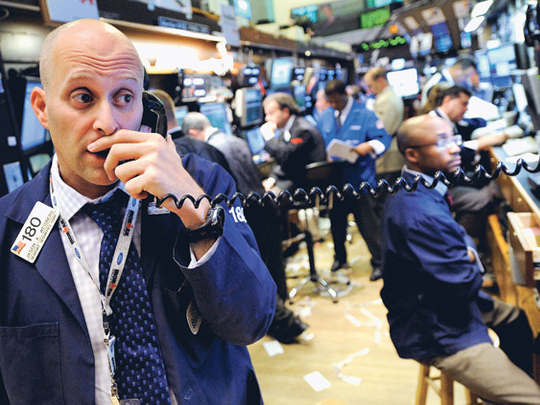
London: World stocks fell yesterday and the euro hit four-year lows against the dollar as investors reacted to signs the US economic recovery may be slowing.
They were also reacting to new debt worries centred on eastern Europe.
MSCI's all-country world stock index was down around one per cent, off its lows, and its emerging market counterpart was off 2.3 per cent.
But Wall Street looked set for small gains and European shares pared losses after better-than-expected German manufacturing data.
Investors sold shares on Friday and continued into yesterday after monthly US jobs data disappointed.
Fewer jobs than expected were added, while a large portion were temporary hirings for the US Census.
That triggered concerns that the recovery in the world's largest economy was not as robust as believed.
At the same time, other fears centred on Hungary, where ruling party officials suggested there was only a slim chance of it avoiding a Greece-style debt crisis.
"The jobs data may have changed market sentiment a bit because the numbers for this important indicator showed what people have been suspecting for a while, that the US econ-omic recovery may be slowing a little," said Japan Chibagin Asset Management fund manager Hiroaki Osakabe.
"Then you have this combined with signs that the euro zone debt problems may be very deep-rooted. Both of these put together are sparking selling."
Hungary itself is of minimal importance on the global level, but there were concerns about exposure among leading banks if Hungary defaulted.
There were also concerns that the fall in the forint might fuel a rise in loan delinquency among Hungarians who have borrowed heavily in euros and Swiss francs.
The global stockmarket plunge also comes hard on the heels of worries about defaults in Greece and other southern euro zone members.
The pan-European FTSEurofirst 300 was down 0.1 per cent. Earlier, Japan's Nikkei closed down 3.84 per cent.
The euro fell broadly, hitting its lowest in more than four years against the dollar.
Higher-yielding currencies such as the Australian dollar also fell as equities and commodity prices took a knock.
Market players said the single currency's close below $1.2135 on Friday, marking a 50 per cent retracement of its 2000-2008 rally, was a bearish chart signal and was adding to the single currency's woes.
Lack of strong concerns at a weekend meeting of G20 finance ministers or from euro zone policymakers also spurred euro selling, traders said.












